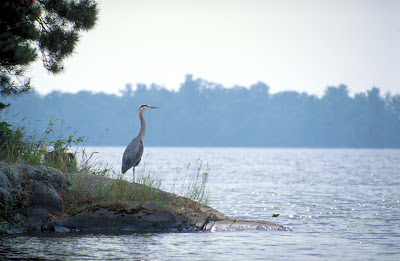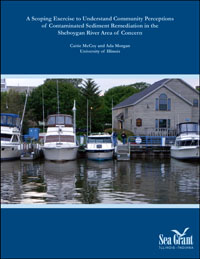 The Great Lakes Legacy Act project began with the development of a master plan and secured funding, with the goal of cleaning and restoring the lake’s natural habitats. By doing so, fish and wildlife populations can be restored, and the lake will be cleaner and safer for recreational use as well.
The Great Lakes Legacy Act project began with the development of a master plan and secured funding, with the goal of cleaning and restoring the lake’s natural habitats. By doing so, fish and wildlife populations can be restored, and the lake will be cleaner and safer for recreational use as well. Category:
Muskegon Lake cleanup project celebrates completion
May 23rd, 2012 by Irene Miles The Great Lakes Legacy Act project began with the development of a master plan and secured funding, with the goal of cleaning and restoring the lake’s natural habitats. By doing so, fish and wildlife populations can be restored, and the lake will be cleaner and safer for recreational use as well.
The Great Lakes Legacy Act project began with the development of a master plan and secured funding, with the goal of cleaning and restoring the lake’s natural habitats. By doing so, fish and wildlife populations can be restored, and the lake will be cleaner and safer for recreational use as well. In the news: Lake Michigan water trail promises more access for recreation
May 22nd, 2012 by Irene Miles“The trail will eventually run from the Wisconsin-Illinois border north to the tip of the Door County Peninsula and south along the Green Bay shoreline to the city of Green Bay.The Lake Michigan Water Trail was selected as one of the top 100 state projects as part of President Barack Obama’s America’s Great Outdoors program that encourages increasing outdoor recreation opportunities close to home.”
In the news: Federal study to help Great Lakes communities prevent floods
May 21st, 2012 by Irene Miles“Federal officials are studying how to help Great Lakes communities better prepare for hazardous floods.‘It will be the most comprehensive study ever conducted of shoreline flooding,’ said Ken Hinterlong, a senior engineer with the Federal Emergency Management Agency. So far, only ‘…the first phase of the project is done, which is a basin-wide data collection for Lake Michigan and Lake St. Clair.’”
GLRRIN Lake Michigan partners examine future of Lake Michigan food webs
April 11th, 2012 by Irene MilesThe term “food web” is used to describe the intricate relationships between the many different plants, animals, and organisms that can exist in small or large areas. Understanding food webs in specific environmental locations, such as in one or more of the Great Lakes, can help researchers and communities better respond to changes in those delicate systems. Invasive species are just one example of a potential influence that can drastically alter a food web and have substantial impacts on native environments.
Study examines community perceptions of river remediation
April 9th, 2012 by Irene MilesCommunication is a crucial part of any project, and especially one as significant as cleaning up an ecosystem that has been deemed an Area of Concern. One of those AOCs is the Sheboygan River, and Illinois-Indiana Sea Grant Environmental Social Scientist Caitie McCoy has been very involved in the remediation project, working with and reaching out to the communities that live near and rely on the river in a variety of ways.
To better understand community views and concerns about the river and the river cleanups going on this summer, several interviews were conducted with local stakeholders. The findings and resulting recommendations are presented in a qualitative study put together by Caitie and Ada Morgan, entitled “A Scoping Exercise to Understand Community Perceptions of Contaminated Sediment Remediation in the Sheboygan River Area of Concern.” You can download and read the entire study here.
Recent News
- IISG’s Eliana Brown wins 2025 Illinois Extension Excellence Award
- We’re hiring eight interns for summer 2026
- In 2026, IISG intends to fund 10 research projects focused on coastal concerns
- IISG looks back on 30 years of AIS outreach
- New step-by-step guide and veterinary brochures expand UnwantedMeds.org resources
IISG Instagram
This season, let’s teach eco-friendly habits while spreading cheer! NOAA’s Greener Holiday Gift Guide is full of ideas to reduce waste and protect our precious water resources.
Check out the full guide at the link in bio.
#teachingtuesday
NOAA Marine Debris
NOAA Education

The gales of November may come early, but, as usual, the nominations for the Lakies are right on time along with our official call for nominations!
Brought to you by the Teach Me About the Great Lakes podcast, The Lakies (aka "quite possibly not the least prestigious Great Lakes-focused awards ceremony there is”) are back.
Our goal isn`t to be the Official Arbiters of Quality, but to host a fun celebration of amazing Great Lakes-related research, outreach, and communication in the inimitable Teach Me style.
Nomination categories are:
-Great Lakes Science Communication of the Year
-Great Lakes Outreach Program of the Year
-Great Lakes News Event of the Year
-Great Lakes Research Finding of the Year
-Coolest Thing You Learned Listening to TMATGL in 2025
-Science Podcast of the Year (Non-TMATGL edition)
-Great Lakes Animal of the Year
-Great Lakes Non-Animal of the Year
-Great Lakes Sandwich of the Year
-Great Lakes Donut of the Year
The Details:
-Deadline: Nominations close on December 4th.
Process: It`s easy (just enter the name/title and a link).
-Self-Nominations: Highly encouraged. Don`t be shy.
We’d love to get a broad swath of work across both the serious and less-serious categories to celebrate. Feel free to pass the link on to interested people: https://bit.ly/Lakies25

Making Sense of Social Media: Presented by Illinois-Indiana Sea Grant & Purdue Extension
When: December 6, 2025, from 1 - 4:00 PM EST
Where: RDM Shrimp, RDM Shrimp, 101 N 850 E, Fowler, IN 47944
Registration Link in bio.
Social media can be a great way to market your small business and products, but sometimes it might feel like you are casting a net again and again to find that your net is empty. After all, the point of using social media marketing is to connect with customers. By attending this workshop, you will:
-Hear Research Findings
-Participate in an Interactive Workshop Session
-Learn Real World Application
-Tour a Shrimp Farm
-Network at the “After Hour Social”
This program is supported by the North Central Regional Aquaculture Center and put on in partnership with the Indiana Aquaculture Association Inc, RDM Shrimp, and Ohio Sea Grant, The Ohio State University.
For questions contact Amy Shambach by email (ashambac@purdue.edu) or phone (317-238-0511)

This fall, our team took advantage of several opportunities to showcase our engaging educational programs at outreach events.
One highlight included the Great Plankton Race, where participants built plankton models and tested various adaptations that help this vital part of the food web survive.

Categories
- Aquaculture
- Aquatic Invasive Species
- Buoys
- Climate Ready Communities
- Coastal Resilience
- Director's Blog
- Education
- Featured
- Fellowships
- Fisheries
- Funded Research
- Funding
- Great Lakes Cleanup
- Great Lakes Data
- Healthy Waters
- Internships
- Jobs
- K-12 Education
- News
- Photos
- Program
- Recreation & Tourism
- Resources
- Sea Grant Scholars
- Stormwater & Green Infrastructure
- Sustainable Community Planning
- The Helm
- Uncategorized
- Video
- Water Resource Economics


